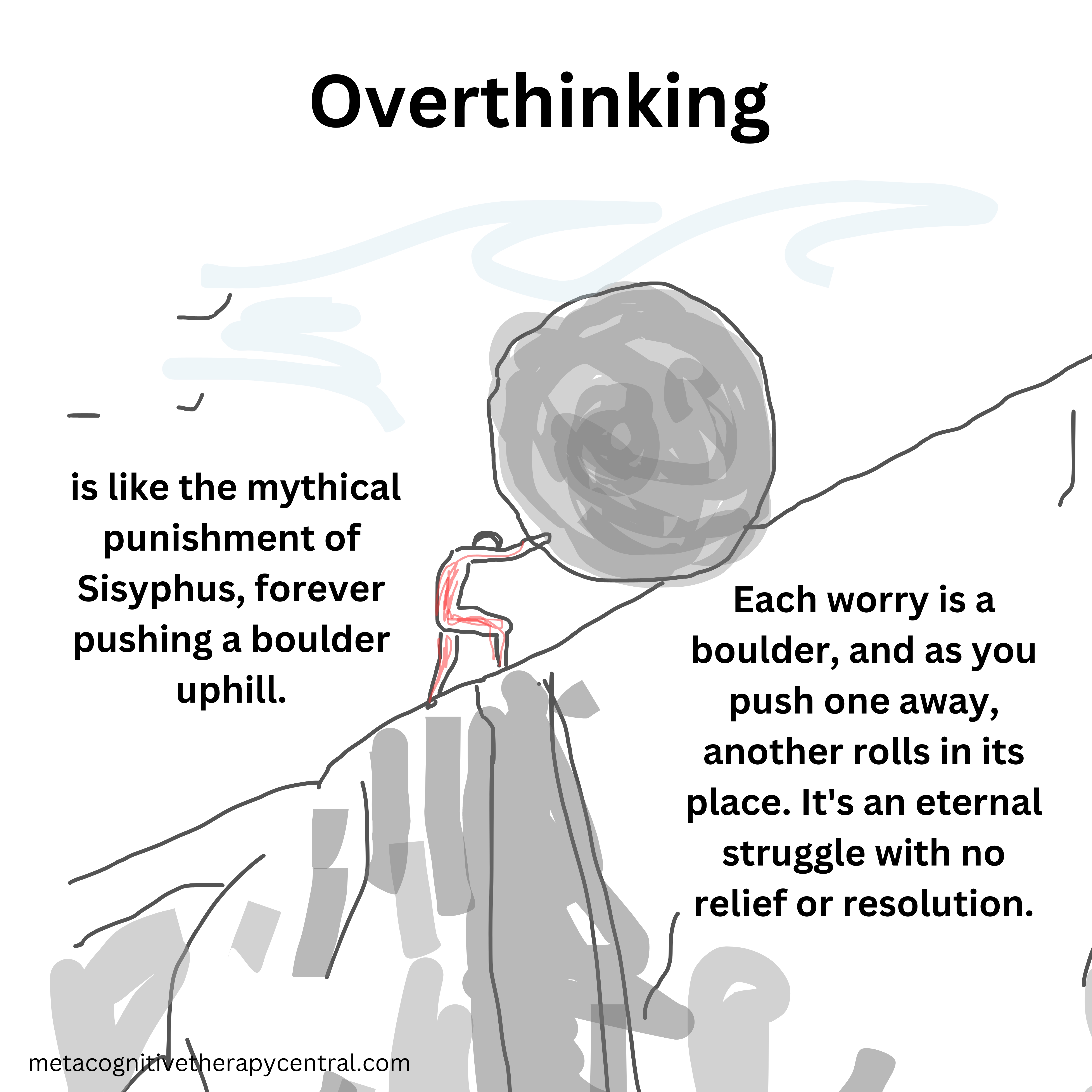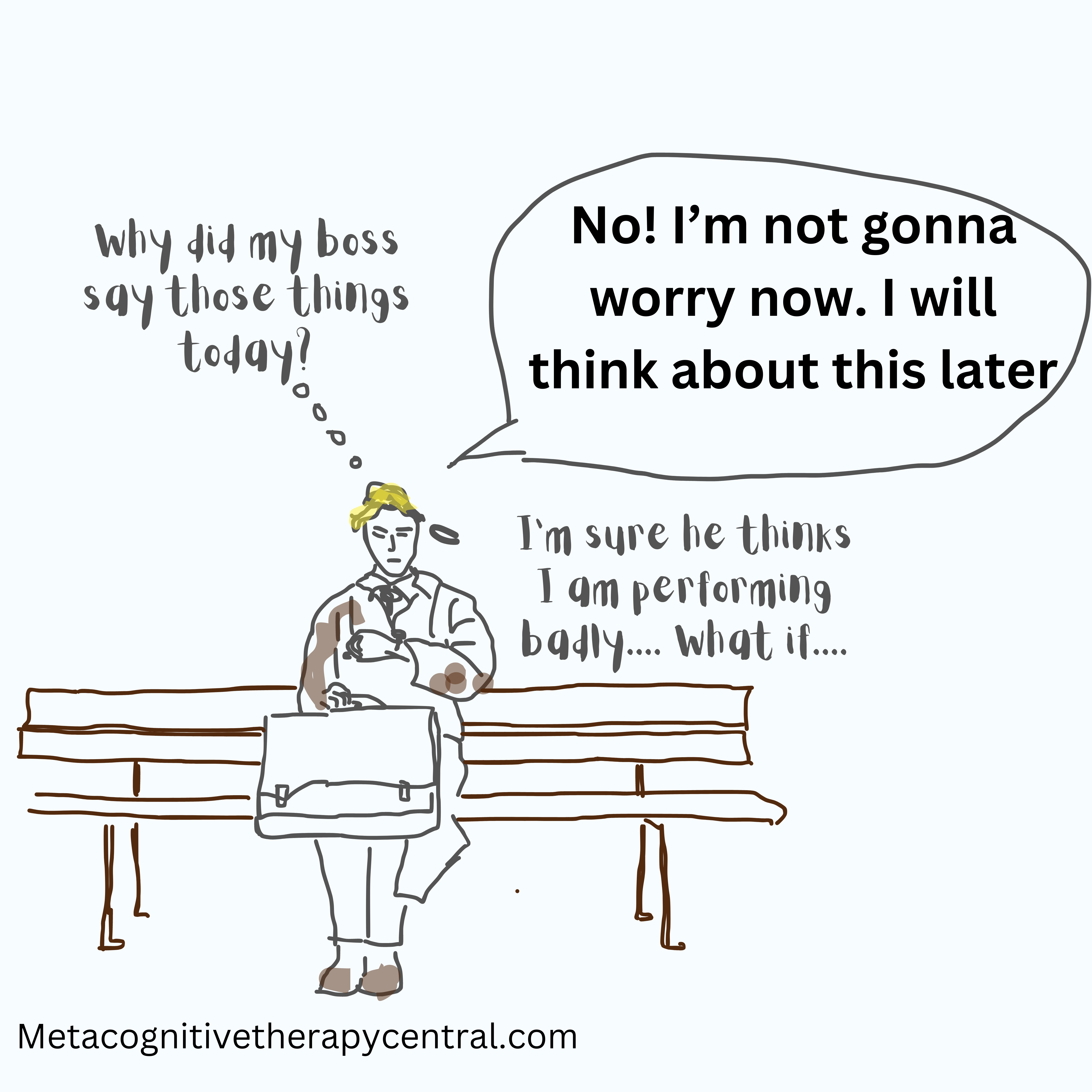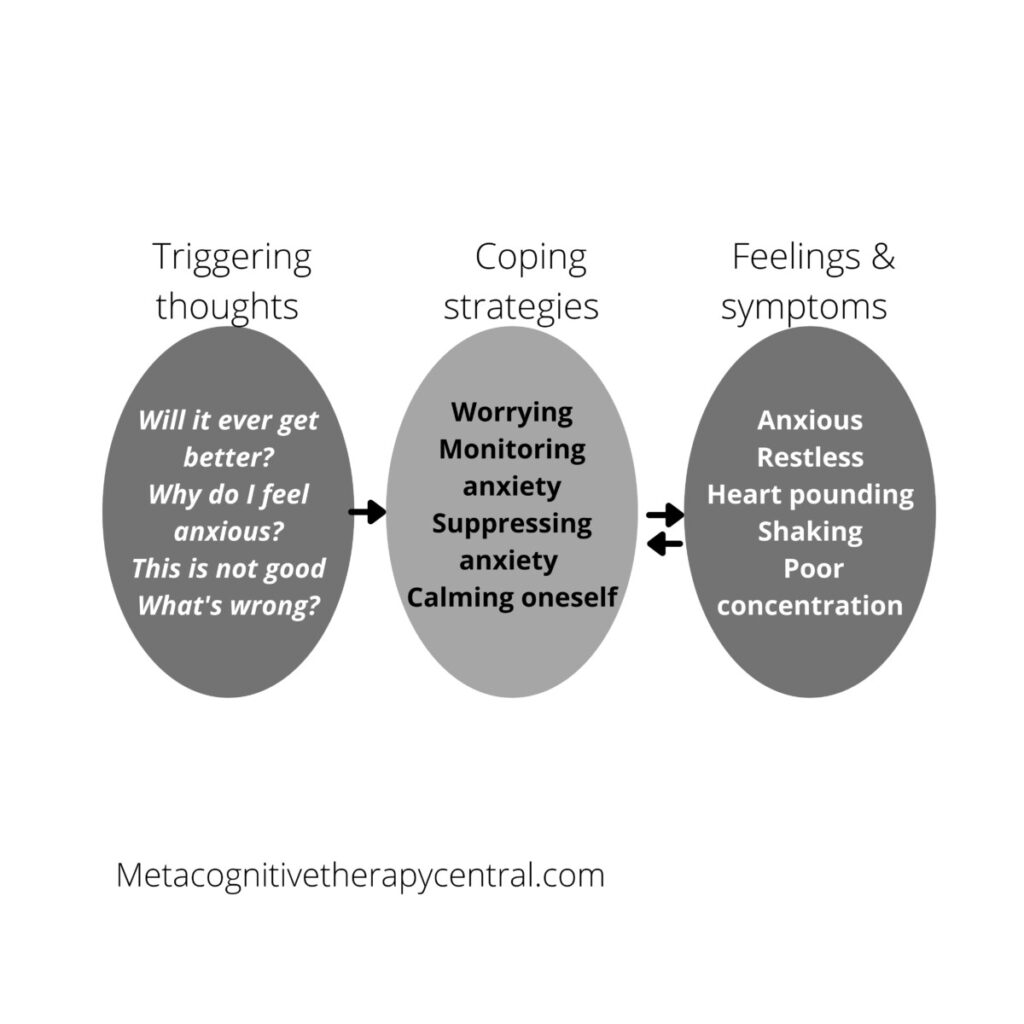Many people overthink from time to time, with some not even realizing it. While overthinking is not harmful, it is unproductive and can strain your mood, potentially leading to depression or anxiety.
Metacognitive therapy (MCT) offers practical strategies to deal with overthinking. To make methods like worry postponement and attention training effective for you, it’s important to understand why you’re using them in the first place.
MCT teaches you to do less to negative thoughts and feelings to allow your mind to heal itself from unwanted thoughts, emotions, and negative experiences.
Helpful Metacognitive therapy strategies to reduce overthinking
| Metacognitive therapy strategy | How to apply it effectively | What not to do |
| Put a label on your overthinking | Ask yourself from time to time; What am I doing in my mind right now? what kind of thinking is this? Acknowledge it and move on with your day | Don’t beat yourself up if you notice that you are worrying or dwelling on negative events. |
| Question the purpose of your overthinking | Ask yourself; Is overthinking this problem actually helpful? Am I finding solutions? If the answer is no, decide to stop. | Don’t spend the next hour contemplating this question. If overthinking isn’t helpful in that moment, decide to postpone doing that for later. |
| Postpone thinking about your problems until later that day | Decide to postpone worrying about your problem for your set worry time at, for example, 6 PM. | Sometimes the problems we try to postpone worrying about keep reappearing in our minds. Don’t use that as an opportunity to start worrying again. Keep postponing. |
| Pay attention on what you are doing externally | Shift your focus back to the activity you were doing before you started worrying (for example, working, cleaning, studying, reading, talking, staring out the window, relaxing) and concentrate on that even though you still feel upset | Don’t start another whole different activity to distract yourself and calm yourself down. |
Put a label on overthinking
Becoming aware of overthinking is vital. Many people, especially those who feel down and depressed, overthink without noticing it. They can overthink for hours and still go through their daily activities without being aware of it.
Maybe this is you. You might be spending several hours a day thinking about problems at work, your relationship, children, your past, etc.
So as soon as you recognize it, simply point it out to yourself. You can for example say to yourself, “I am overthinking/ I am thinking about my past.” This will help you become more aware so you can stop.
Why this works: If you have been overthinking for months or years, the chances are that you are not aware of how much you do it. This exercise helps to raise your metacognitive awareness. When you recognize that you’re overthinking, you now have the choice to stop if you want to.
Instructions: as soon as you notice feeling low, stressed, or anxious, ask yourself: “I wonder what I am doing right now?”

Question the purpose of your overthinking
Some of us tend to believe that thinking a lot about problems or emotions is the most helpful way of dealing with them.
Perhaps you believe some of the following:
Thinking about my problems will help me find answers.
Worrying helps me be prepared.
Understanding why I feel this way will help me get better.
The more you believe that overthinking is helpful, the more you will do it. Of course, there is nothing wrong with thinking about problems and worrying from time to time. But if the emotional consequences of overthinking outweigh the benefits, it might be time to take a look at your beliefs about overthinking.
Do you really believe that thinking about your problems or how you feel leads you to better solutions?
If the answer is no, you can postpone overthinking for later and then start problem-solving instead.
Why this works: Many of us cling to false beliefs about overthinking without ever questioning them. Understanding why you tend to overthink will empower you to challenge these beliefs and prevent wasting time and mental energy on overthinking.
Instructions: As soon as you notice overthinking, ask yourself: “What am I trying to gain from thinking about this problem? Am I getting to any solutions that help me move on?“

Postpone thinking about your problems until later that day
Thinking too much about what to do and how to solve a difficult problem eventually leads to confusion and low mood. The content of the problem you are thinking about does not matter, but the amount of time and energy you spend thinking about it will impact you negatively.
When you catch yourself overthinking, whether it is analyzing or worrying about your feelings or a problem, remind yourself, “I’m overthinking right now. I’ll save it for my worry time later today.” Then, continue with your day, and keep postponing until your designated worry time.
Once you get to your worry time and you don’t feel like thinking about your problem anymore, it is not mandatory to do so. This part is optional and entirely up to you.
Why this works: The mind naturally handles negative thoughts and feelings on its own. With thousands of thoughts passing through our minds daily (some say as many as 60,000), we don’t need to actively manage them. Postponing worries allows the mind to self-regulate in the background while we focus on our daily tasks.
Because of this self-regulatory process, postponing worrying will help your mind filter away 80% of the content. By the time you get to your worry time, only the most important stuff sticks around, making it easier for you to solve problems and concentrate better.
It is a win-win strategy: your mind deals with your emotions for you while you are being productive with other stuff.
Instructions: Set aside 30 minutes every afternoon to think about a specific problem. Tell yourself, “I will think about this later”.

Practice daily to benefit long-term
If you apply these MCT strategies consistently, you will discover how much you are in control of your thinking. You will learn that overthinking doesn’t just happen to you and that it isn’t as helpful as you once believed, making it easier for you to stop.
According to Metacognitive therapy, the consequences of overthinking are low mood, anxiety, depression, lack of concentration, restlessness, low self-esteem, and fatigue. However, you will notice improvements in all these areas when you stop overthinking.
By reducing overthinking, you let your mind take care of itself through self-regulation (a mechanism that manages emotions the same way the body can heal wounds on its own). This approach is more effective than distractions, positive thinking, and other quick-fix approaches that aim to get rid of thoughts.
Whenever we try to get rid of distressing thoughts and feelings, we prolong them.

How to succeed with Metacognitive therapy
Before you start testing out these MCT strategies, remember that they don’t substitute therapy with a trained MCT therapist. This is especially the case if you suffer from anxiety, depression, and OCD or find it very difficult to stop overthinking.
These exercises are part of the MCT manual developed by the founder, Adrian Wells. In therapy, I use these exercises to help change my clients’ metacognitive beliefs (which are beliefs about how our thinking works). For example, practicing worry postponement helps challenge the metacognitive belief, I can’t stop worrying. This change is key for overcoming mental health problems in the long run.
Therefore, these exercises won’t fix your anxiety, OCD, or depression alone. They are most helpful when part of therapy with a trained MCT therapist.
But you can still use them for mild worrying and rumination to understand how to reduce overthinking, compared to traditional therapy where the main focus is on the problems themselves and not the thinking process.

Be consistent
Getting better at something or changing thinking patterns takes time and practice. It is the same with spending less time overthinking. To feel better in the long run, you need to keep using these strategies regularly, even on bad days. Especially on those days.
If you feel frustrated with your progress, remember it is normal to take time to learn something new. And don’t worry too much about every little thing you do (like worrying about “Am I doing this right?“) Just keep practicing.
Remember, don’t stress about doing MCT perfectly. Instead, channel your energy into something else outside your mind, like learning a new skill or exploring an interesting hobby.

References
- Wells A (2019) Breaking the Cybernetic Code: Understanding and Treating the Human Metacognitive Control System to Enhance Mental Health. Front. Psychol. 10:2621. doi: 10.3389/fpsyg.2019.02621
- Wells, A., & Matthews, G. (1994). Attention and emotion: A clinical perspective. Lawrence Erlbaum Associates, Inc.



